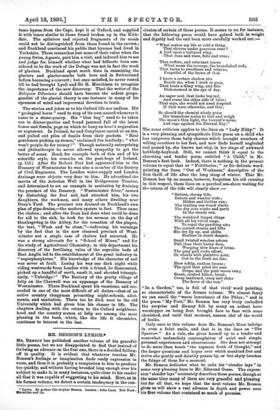MR. BENSON'S LYRICS.*
ME. BENSON has published another volume of his graceful little poems, but we are disappointed to find that instead of its being an advance on the first one, there is a decided falling- off in quality. It is evident that whatever touches Mr. Benson's feelings or imagination finds ready expression in verse, and thus it is probably a temptation to him to produce too quickly, and without having brooded long enough over his subject to make it, in many instances, quite clear to his reader all that it was capable of suggesting to his mind, Here, as in his former volume, we detect a certain inadequacy in the con- Lyrics. By Arthur Christopher Benson. London: John Lane. New York : Macmillan and 00. elusion of certain of these poems. It seems to us, for instance, that the following poem would have gained both in weight and dignity had the end been more carefully worked out:— "What makes my life so cold a thing,
That shivers under generous suns ? A bird upon a tortured wing, That runs and rises, falls and runs; That suffers, and reluctant learns
What mean the scourge, the brandished rod; That turns to sweetness and returns,
Forgetful of the frown of God. I know a certain shadow sits Beside me, when I work or pray,
That beats a filmy wing, and flits Dishonoured in the eye of day.
An eager soul that looks beyond,
And scans the other side of bliss.;
That says, she would not need despond If that were otherwise, and this ; So should the chemist nicely poise His tremulous scales to test and weigh The moon's thin light, the torrent's noise, And rage against the Eternal Nay." The same criticism applies to the lines on " Lady Kitty." It is a very pleasing and sympathetic little poem on a child who has outgrown those baby charms which brought numbers of willing courtiers to her feet, and now finds herself neglected and passed by, she knows not why, in her stage of awkward hobbledy-hoyhood. Still, we cannot think it equal to the charming and tender poem, entitled "A Child," in Mr. Benson's first book. Indeed, there is nothing in the present volume to equal that or " Fritillaries ; " or for delicate word- painting the lines, " Out of Weakness," descriptive of the first thrill of life after the long sleep of winter. That Mr. Benson has by no means, however, forgotten his old cunning in this respect, these lines on a parched sea-shore waiting for tha return of the tide will clearly show
:- "Return, strong tide,
Return and wander wide ; Hither and thither run; The trailing sea-wrack starts, The dry ooze winks and parts In the steady sun.
The wrinkled limpet clings With all his viscid rings,
To repel the parching air;
The mussel strains and lifts His dry lip up, and shifts Restless in dumb despair.
Small twisted conches ashore Pull close their horny door, Weeping slow tears of brine.
The grey gull rocks afloat, Or wheels with plaintive note, Out to the fresh sea line.
Blow softly, restless breeze ; The spell that piled the seas Drops, and the pent waves run ; Break, crested billow, break, Creep landward, creep and slake The fever of the sun."
"In a Garden," too, is full of that vivid! word painting, so characteristic of the former volume. We almost fancy we can smell the "warm luxuriance of the Phlox ; " and in the poem "My Poet," Mr. Benson has very truly embodied the surprise and dismay felt by many an ardent hero- worshipper on 'being first brought face to face with some cherished, and until that moment, unseen idol of the world of books.
Only once in this volume does Mr. Benson's Muse indulge in even a faint smile, and that is in the lines on "The Sparrow." As a rule, she gives herself up to a tender and somewhat melancholy contemplation of quiet and simple personal experiences and observations. She does not attempt to do more than touch "the topmost froth of thought," and the larger questions and hopes over which mankind fret and strive she gently and daintily passes by, or but shyly touches the fringe of them for a moment.
Mr. Benson dedicates what he calls his " slender lays " in some very pleasing lines to Mr. Edmund Gosse. The expres- sion" slender lays" accurately describes these poems, though at the same time many of them are very graceful and pleasing but for all that, we hope that the next volume Mr. Benson gives us will show a real advance in depth and power over his first volume that contained so much of promise.
r


































 Previous page
Previous page